Sixties
City presents
a wide-ranging series of
articles on all aspects of the Sixties, penned by the creator of the iconic
60s music paper Mersey
Beat
|
Sixties
City presents
a wide-ranging series of
articles on all aspects of the Sixties, penned by the creator of the iconic
60s music paper Mersey
Beat
|
|||||
|
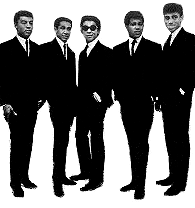 |
A five-piece
vocal harmony group who proved to be Liverpool’s most popular black vocal
act. The Chants evolved in the Liverpool 8 district of Liverpool, the
Toxteth area, which they felt was totally isolated from the rest of Merseyside,
part of it being almost a Liverpool equivalent of Harlem where the black
community had their own cultural influences. The music the Chants listened
to was reflected in their own cultural heritage as they were brought up
on what was to become known as R&B, introduced to them by the black GI’s
who came to Liverpool 8 from American bases such as Burtonwood.
This included doo-wop recordings by outfits such as the Del Vikings, along with the music of artists such as Johnny Otis and Little Richard and The Miracles – this was before these artists became mainstream and their music became the embryonic influence of The Shades, their original name. Joe and Edmund Ankrah’s father was a church minister who played organ and he taught his sons how to sing in harmony. They enlisted a few of their friends to join them in forming a harmony group and rehearsed in the cellar of the Ankrahs' house, initially practicing harmony with a version of Paul Anka’s ‘Don’t Gamble With Love’. Their first approach to The Beatles was reported in an item in the Mersey Beat music paper in 1963: “Last year, Joe Ankrah and his brother Eddie joined a vocal group called The Shades, whose only appearances were in Stanley House, Upper Parliament Street. Due to the fact that a rock ‘n’ roll group in London had the same name, the group decided to call themselves the Chants. Joe went along to the Tower Ballroom during an appearance by The Beatles and he had a chat with Paul McCartney, who asked him to bring the group for an audition. The Beatles liked the group so much that they provided backing for them on a number of appearances”. In fact, when they turned up at the Cavern for an audition, but didn’t have a backing group, The Beatles offered to provide backing for them, but Brian Epstein objected. The Beatles overruled him and The Chants made their Cavern debut on Wednesday 21st November 1962 with The Beatles providing their backing. The group’s leader, Joe Ankrah, wanted to form an American-style vocal group and The Chants were his third attempt. The other members were Edmund Ankrah, Nat Smeda, Alan Harding and Edmund Amoo. |
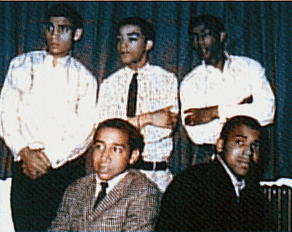 |
Joe first met Paul McCartney at the Tower Ballroom, New Brighton, on 12th
October 1962. He ‘blagged’ his way into Little Richard’s dressing room after
the concert and Paul spotted him leaving. Paul wanted to find out who he
was and was fascinated when Joe told him about being in an acapella group.
He then gave Joe a note, signed by himself, for The Chants to produce at
the Cavern when The Beatles returned from Hamburg which they did, turning
up for one of the lunchtime sessions. They waited for The Beatles to come
off stage and ‘waylaid’ them when they left the dressing room as the gig
emptied. Paul introduced them to the rest of the group and then beckoned them onto the stage. Eddie Amoo recalls, “They went ‘apeshit’ when we started to sing. I can still see George and John racing up to the stage with their mouths stuffed with hot dogs or whatever. The invitation to make our Cavern debut was given as soon as we finished ‘A Thousand Stars’ for them. They insisted we perform that very night. Everything happened completely spontaneously from that point. The Beatles themselves offered to back us when we told them we’d never worked with a band before". "We then rehearsed four songs with them and then we ran home to tell all and sundry that we had ‘made it’! When Brian Epstein arrived at the Cavern that night he refused to allow The Beatles to back us, but they collectively persuaded him to change his mind – and when he heard us he invited us to appear on many subsequent appearances with them”. On that Cavern debut The Chants, backed by The Beatles, performed ‘Duke Of Earl’, ‘A Thousand Stars’, ‘16 Candles’ and ‘Come Go With Me’ before an enraptured audience, their set lasting approximately 20 minutes. Local MP Bessie Braddock took an interest in the group as they were from her Liverpool district, the Exchange ward, and she arranged for them to be the only other Liverpool group present at The Beatles’ civic reception at Liverpool Town Hall. Despite his initial frustration at the Beatles’ agreeing to back The Chants against his wishes, Epstein took over the management of the group early in 1963, but only for a short time and without any formal contract signing. |
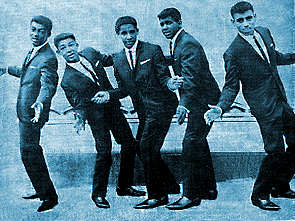 |
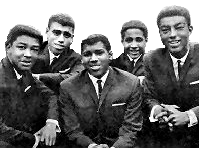 |
The group found him ineffectual as a manager and he agreed to release them.
They then signed with Manchester agent Ted Ross, who arranged a recording
deal with Pye Records. However, they were later to consider they had committed
“professional suicide” by signing with Ross, although they were grateful
for what he tried to do for them. On the special all-Beatles edition of the TV show ‘Juke Box Jury’, the first record played to them was The Chants’ ‘I Could Write A Book’, which they voted a hit – but it became a miss despite their positive comments. The Chants debut disc, ‘I Don’t Care’, flipside ‘Come Go With Me’, was released on 17th September 1963. Their second, ‘I Could Write A Book’, flipside ‘A Thousand Stars’, was released on 1st January 1964. Their third was ‘She’s Mine’, flipside ‘Then I’ll Be Home’ in June 1964, and their final release for Pye was ‘Sweet Was The Wine’, flipside ‘One Star’ on 11th September 1964. Eddie Amoo wrote ‘One Star’, credited to Stanley Houseman, as a tribute to Stanley House where they’d made their first appearance. Stanley House was a social meeting place in the Toxteth area where young met old and black met white to drink, dance and play football, table tennis, snooker and generally mix together. Commenting on their period with Pye Records, Eddie said: “They had no idea what to do with a black 'doo wop' group - they just had no idea”. |
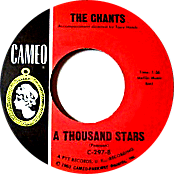 |
Discography
Singles (with links to You Tube): I Don’t Care / Come Go With Me - Pye 7N 15557 1963 I Could Write A Book / A Thousand Stars - Pye 7N 15591 1964 She’s Mine / Then I’ll Be Home - Pye 7N 15643 1964 Sweet Was The Wine / One Star - Pye 7N 15643 1964 Come Back And Get This Loving Baby / Lovelight - Fontana TF 715 1967 A Lover’s Story / Wearing A Smile - Decca F 12650 1967 Ain’t Nobody Home / For You - Page One POF 016 1967 A Man Without A Face / Baby I Don’t Need Your Love - RCA 1754 1968 I Get The Sweetest Feeling / Candy - RCA 1823 1969. |
 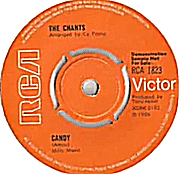 |
|
Article
Text
UK
web hosting by
|